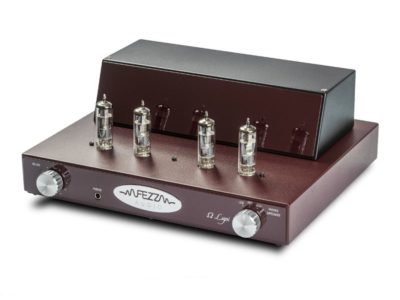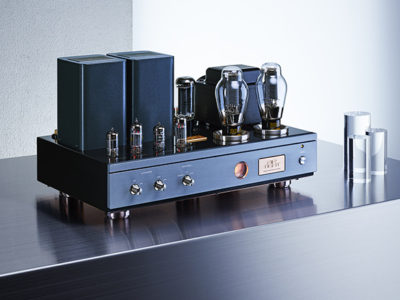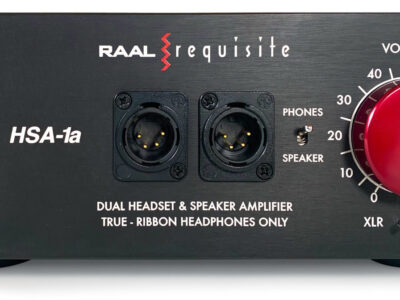Description



The AudioValve Luminare/DAC is a superb tube headphone amplifier and DAC capable of driving Electrostatic, Planar Magnetic and Dynamic headphones to their full potential offering state of the art results.
AudioValve puts most of their budget towards the sound quality of their design and components rather than all of the audio jewellery and marketable designs featured by some of the comparable sounding amplifiers on the market. On sound alone it outclasses its price point, as for performance, design, fit and finish it far exceeds our expectations and represents a truly exceptional product at double or triple it’s price category.
Sound wise this amplifier delivers great tonality, world class 3D sound stage, a noise floor on par with all but the very best valve based amplifiers, and macro and micro dynamics in spades.
The sound quality of the Luminare is of absolute top reference level for a headphone tube amplifier. The pros to this are a very low noise floor, low distortions, high frequency range, high damping, very natural and musical tonality, wide impedance matching, perfect open soundstage and so on. This amp isn’t for the weak of heart – it is an audioholic’s dream. Highly recommended is an understatement.
ADDITIONS TO THE LUMINARE TO LISTEN HIGHRES FILES LIKE …..

AudioValve offers an in-house DAC developed by Manfred Penning. The description can be found under PRODUCTS / DAC. For those who do not want to play their HIGHRES files via our DAC, AudioQuest now offers an inexpensive option with the “DRAGONFLY”. This USB – DAC can also be connected to an iPhone with the help of an adapter cable and who owns a TIDAL subscription – which now also plays MQA Masterquality Files – really hears music at the highest level even for a small fee.
So, the DragonFly on the one hand via the adapter cable to the mob phone, the other side of 3.5 mm jack in the analog input of Luminare and enjoy the maximum sound quality its amp.

LUMINARE – version 2016
with remote control and prepared for DAC setup
AWARD – best headphone amplifier 2016 more then 1000,- USD


“The best is the enemy of the good … “
AUDEZE present here goods on the show CANJAM 2015 in Cosa Mesa with AudioValve`s LUMINARE …

of course you could also use at Audeze on the CANJAM another established headphone amplifier – but you didn’t,
you had consciously chosen to Luminare. Why Audeze had probably done it – everyone knows the answer …..

| The story of LUMINARE.I do not really know why I have driven this project forward not many years ago. I think I was busy with a lot of other developments as well as trivial things like earning money for example. Perhaps mine is simply unaware that their headphones and amplifiers are experiencing a large hipe for years.
Anyway, the beginning of 2014 resulted in discussion with colleagues that I would have some products in my program that seemed almost ideally suited to put with the requirements of the headphone market apart. No sooner said than done. First, the IMPEDANCER befell a technical revision, it was expanding the range of applications for the RKV Mark 2 significantly, especially as a female teflon connector for headphones STAX was inter alternates. The bias voltage was obtained from the voltage signal, so no external power supply is in advance required. VERTO was born and VERTO laid the foundation for all further considerations in this topic, culminating now in the product with the name LUMINARE. I can excuse at this point only for me actually that I started so fundamentally important development in the headphones sector so late (I slept through) and had thus deprived the public a potentially groundbreaking product. Many of you have their money invested now possibly poorly because there was nothing else on the market – that really am sorry. But now back to Luminare. It seemed to me as the basis for such a project, the OTL circuit of the RKV downright awesome. First, they had already claimed stable over decades in the market and on the other they had characteristics that should prove to be just the Luminare be extremely efficient and more full development. There would be for example the superior damping factor, low internal resistance, high bandwidth, and not least the low harmonic distortion he always particularly distinguished the RKV. Now it was in principle “only” about output transformers so be interconnected in the OTL principle, which can be obtained if possible upright with transformer all these benefits. The advantage to couple a outpt transformer to an OTL circuit is that the repercussions and influences on the circuit itself ( either headphones or transformers ) are considerably lower. And this brings a projection on presence in the music, the listener will appreciate very quickly. Everything else on this project was for me then just “routine”. A new circuit board develop, expand the circuit according to the light of all electro – physical principles and my over 45 years of experience in this topic. And ladies and gentlemen, I am more than satisfied with my work, I hope you are there also – Helmut Becker
|
| features:power consumption: 80 VA nominal – 120 VA full load power switch ON / OFF headphone protector +10 dB gain switch 2 x switchable inputs 1+2 input 1: set XLR jacks with parallel RCA input 2: RCA only 2 pair jacks as signal IN / OUT loop 1 x RCA PRE – OUT, -20dB 2 x NEUTRIK Combo jacks 6,3mm + XLR 1 NEUTRIK 4 pin headphone jack 1 x STAX Teflon female connector 1 x ALPS Potentiometer 1 x 3 mode switch, LI – OTL – STAX 2 x 8 watt / 200 ohms load tube: 4 x ECL 85 ( 6F5P ) damping: 600 ( 200 ohms load ) and more …
In summary, this means: Note: Thus is L U M I N A R E the ONE AND ONLY headphone amplifier on the market that is able to drive all standard headphone loads, starting from 3 ohm up to 145.000 ohms. We ask anyone who would like to add something to the user manual of homemade experience with Luminare to a corresponding text note to Mr. Becker.
|
Rear side connector panel
Follow the forum posts for more information about Luminare !
OTWIN MAAS – Moderator OPEN-END-MUSIC, Germany “Dies ist der beste Kopfhörer – Verstärker mit dem ich jemals zu tun hatte“ “Den Violectric V281 konnte ich mir im Vergleich mit dem Luminare anhören. Er ist ein gelungener KHV, der aus meiner Sicht klanglich über dem Vorgänger V200 steht, jedoch in der Gesamtbewertung nicht an einen Luminare heranreicht. Er hat nicht dessen Klarheit im Klang, stellt nicht dessen dreidimensionalen Raum hin und erreicht ihn auch nicht in Sachen Klangfarbe bzw. natürlicher Darstellung. Aus meiner Sicht bedient ein Luminare eine Klasse, die komplett über einem V281 liegt.” [ O. Maas) The Violectric V281 I could listen to me compared with the Luminare. He is a successful amp, which is in my opinion sound than its predecessor V200, however, does not come up in the overall assessment of a Luminare. He does not have the clarity of the sound does not put out its three-dimensional space and also does not reach him in terms of tone and natural representation. In my view, a Luminare served a class that is completely a V281. [O. Maas) Egal ob mit hoher oder mit niedriger Impedanz, mit hohem oder geringem Wirkungsgrad, egal ob dynamisch oder Magnetostat – keinen der angeschlossenen Kopfhörer habe ich bisher so erlebt, wie über den RKV 3, da öffnen sich tore zu neue welten.
No matter if high or low impedance, high or low efficiency, whether dynamic or magnetostat – none of the connected headphones I have ever experienced so how about the RKV 3, it will open doors to new worlds. Aucune importance si le casque connecté présente une haute ou une basse impédance, une sensibilité élevée ou faible, qu’il soit électrodynamique ou isodynamique. Quel que soit le casque utilisé, je n’ai jamais connu un tel résultat que celui obtenu avec le RKV 3. Il ouvrira les portes sur de nouveaux mondes.
review by Dr. Martin Mertens, EAR – IN, 2/3 – 2015 ( RKV 2 + 3, basic concept for LUMINARE ) |
|
LOW IMPEDANCE mode: – test load 32 Ohm: 1 Khz – 0,1 watt – 0,06 %
10 Khz – 0,1 watt – 0,06 % bandwide: 15 – 100.000 Hz min.: load 3 ohm ( 3 watt / 0,33 watt – 0,15% ) |
OTL mode: test load 220 Ohm. 1 Khz – 0,1 watt – 0,015 % 10 Khz – 0,1 watt – 0,08 % bandwide: 12 – 150.000 Hz max. load 2000 ohms – min. load 50 ohms tested example: |
STAX mode: ( auto gain control ) bandwide: 15 – 150.000 Hz |
| gain overview :Mode: Low-Imp ~ 16.5dB / and STAX connector 32dB + 10dB ( galvanic coupled sym. balanced complementary output STAX connector signal ) + 38 db Mode: OTL ~ 32dB ( amps gain only, step – up transformer less ) – STAX connector no supported Mode: STAX only ~ 60dB ( 32dB +10 dB switch gain increase +15.5 dB galvanic coupled balanced step up tranformer ) all other jacks supported too !!!
Description of some technical details … The output impedance at Luminare with negative feedback (physical concept: closed loop) is defined as follows. Example: The OTL mode provides Luminare 1V without load resistance and 0.998 V at 60 ohm load resistor. |
|
|
| Explanation of the + 10 db gain switch circuit for Stax mode.A green internal LED of the front left on the board signals, that LED on gain increased by an reed relay up to +10 db.
|
| This white LED indicates when the bias voltage built up for the Stax headphones and stable.
|
If you turn on the amplifier, reducing the volume and wait until this red LED goes off. As long as this red LED seems light up, all outputs of the amplifier is short-circuited and thus protect the headphones when the amp load or un – load the internal caps. This is always the case when the amplifier ON and OFF switches.
|
The transformer was installed outside of the amplifier. This has the advantage on that the heat of the power transformer remains from the device and, second, that no stray magnetic fields cross the output transformer or the circuit board and modulate them. In addition, the transformer was covered with a layer of transformer sheet and thus absorbs stray magnetic fields. Then the transformer with a 2-component potting shed was in a metal cup.
|




( describtion coming soon …. )




|
Warranty and tube Note
:
On each board is the model name of the product and the name of the tubes is set. So if you are not sure which tube you need, please look at the circuit board and watch what is written there (PCL805 – or ECL85 (6F5P)
In mid-2015 has been changed from PCL805 on ECL85 that affects the models RKV all, Luminare and Solaris |
The warranty is void if the top glass of the amplifier is taken within the warranty period. Also void the warranty, if other than that we offer tubes are used for the so-called “tube rolling”. To buy new tubes, please contact your dealer, he has recommended tubes on stock. Incidentally Tube Rolling is simply stupid in the models RKV, Luminare and Solaris. You can convince yourself by knocking on the tubes, they will not hear any knocking sounds in the headphones.
|
The picture below shows you the max. Output voltage before start soft clipping in OTL mode at 220 Ohm load per channel – at 43 Vrms are on each channel 8,3 watts |

















